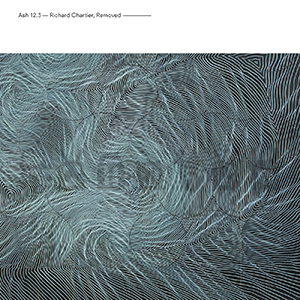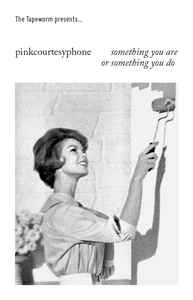Richard Chartier, "Removed", Pinkcourtesyphone, "Something You Are Or Something You Do"
 With both of his primary projects releasing new material at nearly the same time, it becomes tempting to compare and contrast Richard Chartier’s academic-tinged solo work with the slightly campy (at least in presentation) Pinkcourtesyphone, and at the superficial level there is a lot of similarity. Both Removed and Something You Are Or Something You Do are slow, sparse works that at times drift into near silence, but besides the mood and presentation, the actual compositional approach separates them most. The two are rather distinct works that each capture part of Chartier’s style extremely effectively.
With both of his primary projects releasing new material at nearly the same time, it becomes tempting to compare and contrast Richard Chartier’s academic-tinged solo work with the slightly campy (at least in presentation) Pinkcourtesyphone, and at the superficial level there is a lot of similarity. Both Removed and Something You Are Or Something You Do are slow, sparse works that at times drift into near silence, but besides the mood and presentation, the actual compositional approach separates them most. The two are rather distinct works that each capture part of Chartier’s style extremely effectively.
Ash International/The Tapeworm
Right from the onset of "Removed 1" (one of two lengthy pieces that comprise the album) the more clinical tendencies of Chartier's work are on display.What sounds like the ambience of an empty room is presented: a bit of still air and only a hint of environmental sounds slip through but are not at all easily decoded.Subtle panning makes it clear that there is actually something to be heard, as empty and spacious though it might be.Eventually more distinct sounds appear:icy and slow, but they carefully drift in and fill out the mix.The piece stays extremely hushed for most of its duration, but it is that subtlety which makes it so captivating.Eventually the entirety of the piece becomes more commanding, a pastiche of rich electronics and sounds that at times rumble the low end, and at others are near tinnitus inducing.Towards the end he gets a bit more forceful with the larger, more enveloping tones that appear, but it is clearly an experience designed for headphones.
For "Removed 2", Chartier once again accomplishes quite a lot drawing from an intentionally limited array of sounds.Opening with a passage of what almost could be wind, the volume is adjusted here and there but on the whole the piece stays rather consistent.It is comparably even more sparse:a gentle hum through frigid air for much of its opening.There are multiple changes and developments throughout the piece's 23+ minute duration, but they are so intentionally minute and understated that significant attention is required to appreciate them.
samples:
 
 Something You Are Or Something You Do, the latest Pinkcourtesyphone release, seems like a proper fit for the cassette format.For a project so tinged with vintage imagery, the medium is perfect.The analog imperfections of the tape work as well, as the gentle hiss adds to the barbiturate haze in its own way, but would have been entirely distracting for Removed.Right at the start "But it Felt/In Other Dreams" is far more commanding:a hazy, almost spacy wall of sound extending out with just the right amount of rumble to it.Despite some shimmering passages that shine through, it is a rather bleak and haunting bit of music, amongst the darkest in the PCP catalog.
Something You Are Or Something You Do, the latest Pinkcourtesyphone release, seems like a proper fit for the cassette format.For a project so tinged with vintage imagery, the medium is perfect.The analog imperfections of the tape work as well, as the gentle hiss adds to the barbiturate haze in its own way, but would have been entirely distracting for Removed.Right at the start "But it Felt/In Other Dreams" is far more commanding:a hazy, almost spacy wall of sound extending out with just the right amount of rumble to it.Despite some shimmering passages that shine through, it is a rather bleak and haunting bit of music, amongst the darkest in the PCP catalog.
The other side of the tape, "She Who Controls" is cut from a similar cloth, but has a greater density and sense of texture to it.The errant crackle gives a nice depth to the frigid roar that surrounds it.Compared to what preceded it, there is less change and more sustained, cavernous like dynamics to the piece.Structurally it is as stripped down as Chartier’s work on Removed, but with more demanding, forceful sounds.The ending is perhaps the most striking part of the composition, however, with a quick transition to lightness and bell-like tones that are far less oppressive than what preceded it.
On the surface, Richard Chartier's solo work and Pinkcourtesyphone may seem quite alike:both are projects of lengthy compositions, often kept at rather quiet volumes, and comprised of sparse, electronic tones and textures.Listening to them back to back, however, the distinction is very clear.Removed comes from more of a sound art background:classically minimalist with staunch attention to detail and structure.It is clinical, but not cold or inhuman in its character.Comparatively, Something You Are feels less rigid, yet there is a malignance in its enchanting ennui.It feels structurally looser, and a greater sense of rawness due to the more dissonant sounds Chartier is working with.But what it comes down to is that the two sides of this one brilliant artist’s work compliment each other perfectly, and both are essential listening, in my opinion.
samples:
 



